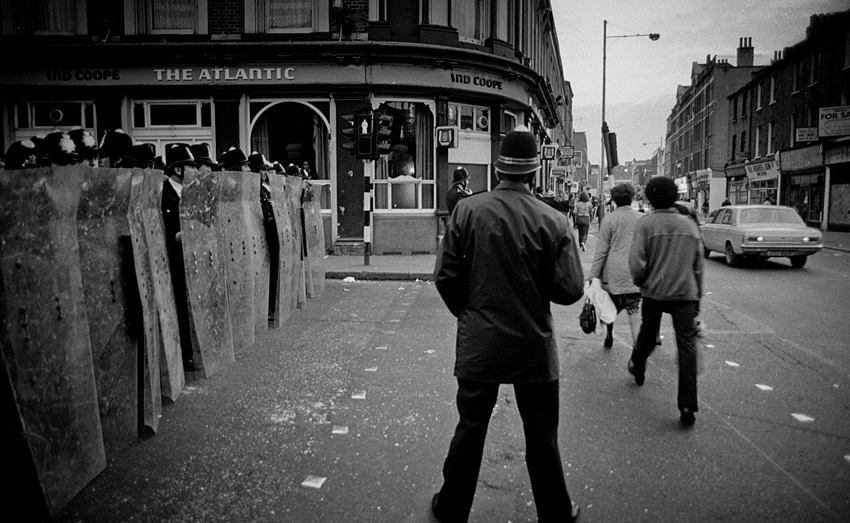This weekend marks the 40th anniversary of the Brixton Uprising (10 – 12 April 1981). These three days of clashes between police and civilians on the streets of Brixton were a landmark moment in the fight against racist and brutal policing, and for racial justice in the UK.
A few months prior to the Uprising, thirteen young Black people aged 14-22 died in a house fire in New Cross, which was widely understood to have been started in a racially-motivated arson attack. This horrific incident received little acknowledgement from the police or UK government. In response to the subsequent investigation, which ruled out arson, between 5,000 and 25,000 people met for the Black People’s Day of Action, which although overwhelmingly peaceful, was policed heavy-handedly. These events were among innumerable examples of racism at all levels in the UK, escalating racial tensions, and unmet demands for justice that paved the way to the Brixton Uprising. Others include the Mangrove Nine protest and court trial which you can learn more about here.
The Black Cultural Archives are a great resource for learning more about British Black History. We also recommend Steve McQueen’s brilliant series Small Axe, available to view on BBC iPlayer, as an additional educational resource. Small Axe is an anthology of five films each telling distinct stories about the lives of West Indian immigrants in London from the 1960s to the 1980s.
In 2018, ONCA hosted Jacob V Joyce’s exhibition A Bridge of Fire. This explored aspects of Black British experience, with a focus on commemorating victims of police brutality and celebrating Black activists. It included a sculptural piece, made from a fire door from a block of flats in New Cross, that responded to the New Cross Fire and made links between the structures and assumptions that drove that and the 2017 Grenfell Tower disaster. You can read more about Jacob and the exhibition here and watch a short video about it here (includes transcript). Jacob is currently fundraising to finish a public mural commemorating the Brixton Uprising which you can support here.
In the context of the ongoing police and state brutality highlighted by the 2020 Black Lives Matter protests, (see the work of UK groups such as United Friends & Family Campaign), of the erasures and abnegation of accountability in the UK Government’s recently published Commission on Race and Ethnic Disparities, and of a broader policy context that fosters the Hostile Environment and includes proposals for draconian reforms to asylum laws as well as policing and punishment, it is clear that inadequate progress towards racial, economic and class justice has been made in the decades that have passed since the Brixton Uprising. Systemic racism in the UK is a huge issue that, centuries after Britain began its project of colonialism, continues to cause significant harm to Black and POC communities. ONCA remains committed to supporting all efforts to dismantle it and work towards racial justice and equity.
Image credit: Kim Aldis
—
Share on Twitter /
Share on Facebook
Posted on April 8, 2021
Categories: Art for Social Change, Decolonising Art & Culture, Environmental Justice & Activism
Tags: 2021, anti-racist practice, Black Lives Matter, Brixton Uprising, Racial Justice
→ O N C A’s statement in response to Sarah Everard’s killing
← Barge Community Mornings are back!
